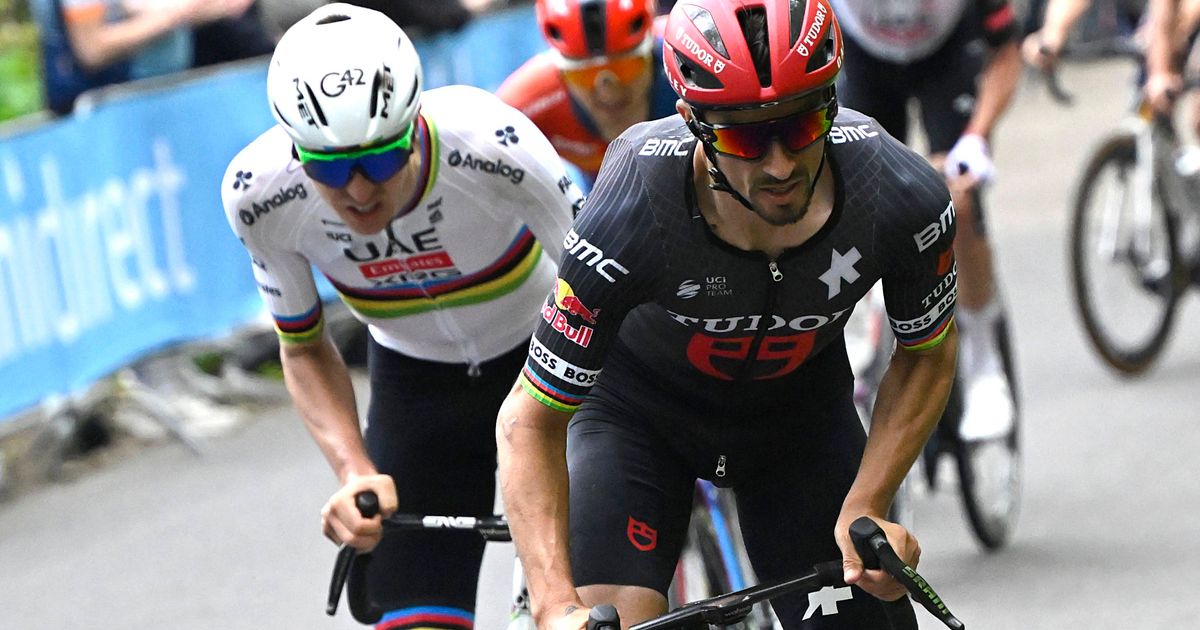Alaphilippe was a World Champion in Imola and Leuven in the start of the 2020’s, and this was in the years that followed his mythical 2019 Tour de France where he won two stages – one in yellow that was a time trial – spent most of the race in the lead and gave the French reasons to dream of their first Tour de France win in almost 40 years. Although that did not work, he has plenty reasons to look back at that time fondly, having won six times at the Tour (with triumphs both at the Giro and Vuelta too), winning Milano-Sanremo, Strade Bianche, the KOM jersey at the Tour de France, Clàsica San Sebastián and much more… But by the time 2022 came his level was not the same, largely due to the many crashes and illnesses that began affecting him, and then because of Patrick Lefevere, who had issues with the lack of performance from a rider who took much of the team’s budget. Whilst he said on multiple times that it was not personal, the constant criticism from your own boss which even included comments on Alaphilippe’s wife Marion Rousse was downright out of limits and his departure from the team was obvious. So Alaphilippe left at the end of 2024, and interestingly so did Lefevere…
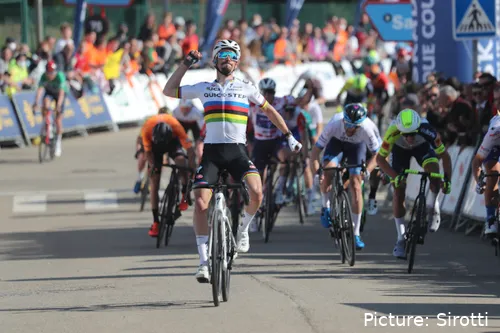
Alaphilippe carried the rainbow stripes for two years in a row at Quick-Step. @Sirotti
Unsuccessful start, but Tudor grow in media presence
Over the year CyclingUpToDate attended several media events of Tudor Pro Cycling and it was clear that the team was pulling out all the stops to put on a professional stance, having its first year as a team with a big name, big riders and a lot more pressure attached to them. Alaphilippe was their big man, the former World Champion, Grand Tour stage winner and monument slayer… With Marc Hirschi coming on board and Fabian Cancellara as team manager there were plenty big faces to represent another team that can be described to have World Tour level.
But the results were not there. Alaphilippe can’t be faulted, less and less currently there are races fit for the pure puncheurs such as him, whilst the likes of Tadej Pogacar and Remco Evenepoel (also tremendous climbers, sprinters, time trialists, etc.) have also become the best puncheurs in the world. It is simply a difficult period for the men who specifically specialize in the mid-duration uphill efforts, which includs the veteran. He doesn’t truly have any result to show for in the spring, and perhaps his most notable moment is the attack at Amstel Gold Race, which didn’t lead to a result but did lead Tadej Pogacar into what seemed at the time to be a certain victory.
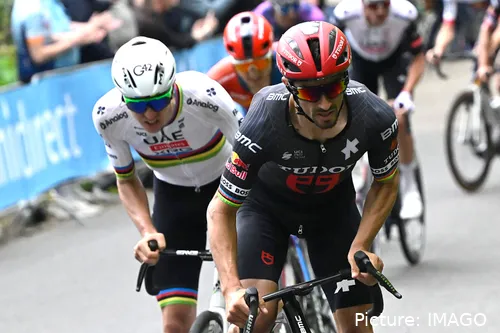
Alaphilippe didn’t exactly deliver results in the spring, but he delivered… ‘aura’. @Imago
Best climbing level ever at the Tour de Suisse?
But as the summer came so did a stronger Alaphilippe. The climbing level in the 2025 peloton is several notches ahead of that of 2019 where he battled for the Tour de France victory. His fifth place in the GC, including high mountain stages, was highly impressive for a rider who simply isn’t a climber, and was the ideal sign ahead of the Tour de France. His fifth place on stage 2 isn’t to be ignored, he finished only behind Mathieu van der Poel, Tadej Pogacar, Jonas Vingegaard and Romain Grégoire in the hilltop finish at Boulogne-sur-Mer. This level, on any race of the calendar that didn’t feature the commonly termed ‘aliens’, would’ve been victory-worthy. But the Tour is the Tour, and you don’t win the Tour unless you have the perfect legs, luck and/or great timing.
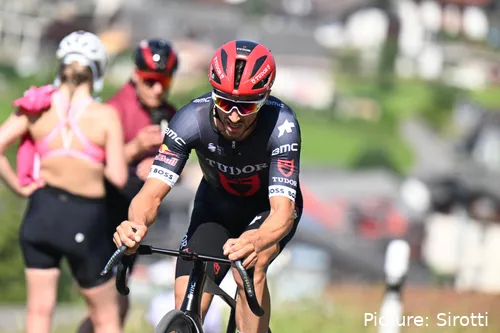
Alaphilippe the climber? @Sirotti
Strong end to the season
Alaphilippe thought he had won on stage 15 into Carcassonne, a triumph that would’ve indeed changed the course of his season. For brief moments the Frenchman thought he had done it, but wasn’t aware that both Tim Wellens and Victor Campenaerts had already crossed the line by that time. Whereas in April he had an astounding attack and picture with Tadej Pogacar suffering in his wheel, in July he celebrated a Tour win that he didn’t achieve (not the first time in his career, when it comes to big races) with none other than Wout van Aert looking at him in disbelief.
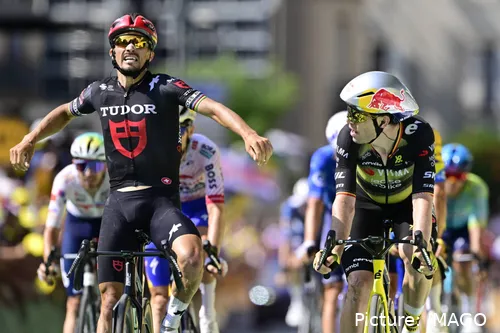
Alaphilippe won the GP de Québec, but for a few seconds, he thought he had also won at the Tour de France. @Imago
Still the 33-year old ended his season with another fitness peak that was very well planned and executed. The Tour of Britain was used as preparation for the late-season classics and there he finished third, also climbing with the best at The Tumble where the climbers had the advantage. The writing was on the wall, and with his traditional panache and strong legs on the day, he managed to take a strong and meaningful solo win at the World-Tour level GP de Québec, something he and Tudor needed. He still went on to finish a strong third place at Tre Valli Varesine later in the year, won by Tadej Pogacar, reinforcing Tudor’s status as a big-league team (which Michael Storer then went on to convince by joining Pogacar and Remco Evenepoel at the podium of Il Lombardia).
The level of success out of Alaphilippe’s transfer depends on what you’d expect of him. If you expected a rider hoping for and going for big Grand Tour or World Championship wins, this wasn’t ever going to happen realistically. But talking out of an exposure point of view as well as having realistic expectations comparing to his last few years on the bike, then I think he did exactly what was expected of him and delivered for the Swiss team.

